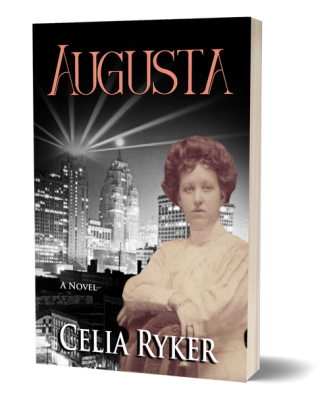
The early 20th century was unforgiving on many women. Writer Celia Ryker’s grandmother was one such woman who had more than her fair share of a hard life. Ryker has written a powerful, insightful novel (Augusta) based on the exploits and overwhelming challenges her grandmother faced during the Depression.
Raised on a hard-knock farm in Arkansas and married off to the father of one of her classmates at the age of 13, lead-character Augusta was not set up for a life of bliss. Then, abandoned by her second husband in 1920s Detroit, with four children to provide for and only an eighth-grade education, she is forced into a decision that will haunt her forever.
From the author of Walking Home: Trail Stories, Ryker's Augusta is gripping historical fiction based on the true, against-the-odds story of her grandmother, a woman who fled the hardships of the Ozarks at the turn of the 20th century for a new city, and a chance at a better life. She had to confront the kind of poverty that you can almost smell, the kind that is in the background of the Neapolitan novels by Elena Ferrante and The Grapes of Wrath. All three novels tell us that poverty has to do with a lot more than money. Self-worth is measured differently by the poor, so are luxury, duty, comfort, and success. The poor are snared by forces outside their control.
Some readers might find this a heroic story, but there were millions of farm folk like Augusta at the beginning of the 20th century. They did what they needed to do to survive. Men were sheared of their dignity when they lost the farm or lost a job, and couldn’t support their families. Like Augusta’s two husbands, they often turned to alcohol in their shame. The women made do, taking responsibility for the children.
Her particular struggle was common in the early 1900s: Marriage at 13, children born as they came, a move from the farm to the grinding, dirty, dangerous city, and meeting new immigrants who had fled similar hardships.
Details carry the story and are constantly surprising. The reader learns how the first washing machines worked, how unwelcome a hospital birth was after knowing the intimacy and convenience of having your baby at home, and what tenements were like.
Historical novels require strong characters with heart -- and Augusta’s heart shines through a life filled with adversity. Augusta puts her head down and does what must be done to provide for her children. Her unshrinking strength is an inspiration.
Ryker's previous book, Walking Home: Trail Stories, is about more than mud, sweat, and blisters while distance hiking the Long Trail. Reminiscent of Cheryl Strayed's Wild, Ryker's mind wanders as her legs carry her forward, beyond a woodland path, to places and people she thought she had forgotten. Her grandmother's spirit appears on Mount Baker. A lost cousin waits for her at the bottom of every ladder. Her late father's words reverberate among the calls of barred owls. There were days when she didn't see another hiker, but she was never alone. Ryker began writing about a difficult hike and ended up writing about the people who inspired her throughout her life. These are her "trail stories."
“Augusta shows women everywhere that no matter how hard one’s journey is, the key is to keep moving, and to not let one’s past or rough start dictate their life’s outcome,” concludes Ryker.








